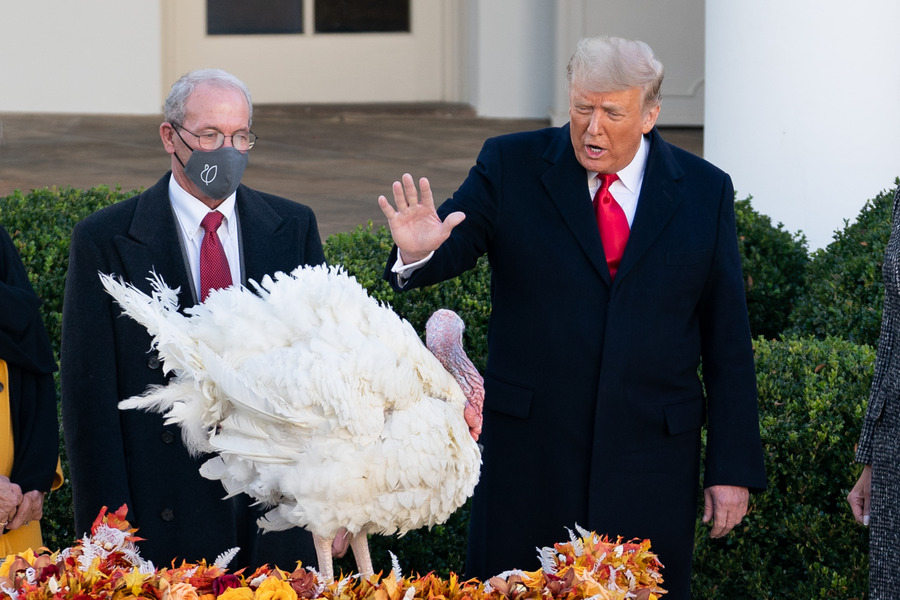General Martins on Rule of Law Green Zones, Afghan Criminal Prosecution, and Other Updates from the ROLFF in Afghanistan
Earlier today, General Mark Martins participated (by teleconference) in a press conference in order to bring folks up to speed on the Rule of Law-Field Force's (ROLFF) latest activities in Afghanistan (for prior discussions of this topic by General Martins here at this blog, see here, for example). The full transcript is posted here. The point that really stood out to me was ROLFF's emphasis on establishing rule of law-supporting "green zones" in which the many partic
Published by The Lawfare Institute
in Cooperation With

Earlier today, General Mark Martins participated (by teleconference) in a press conference in order to bring folks up to speed on the Rule of Law-Field Force's (ROLFF) latest activities in Afghanistan (for prior discussions of this topic by General Martins here at this blog, see here, for example). The full transcript is posted here. The point that really stood out to me was ROLFF's emphasis on establishing rule of law-supporting "green zones" in which the many participants in the Afghan justice system--from judges on down--can carry out their functions in conditions of relative security. In any event, please give the full transcript a close read if you are interested in rule of law operations and the intersection of COIN and rule of law concepts. Below the fold, I also provide excerpts of various detention-and-prosecution related passages from the event. These were not the main focus of his remarks, but given the frequent focus of this blog on detention-related issues (and given my own interest in the issues associated with shifting from LOAC-based detention in connection with overseas deployments to host-nation criminal prosecution), I thought these were worth highlighting:
GEN. MARTINS: ... The large Sarposa detention facility in this area, run by Afghanistan’s Ministry of Justice, has in recent years been chronically vulnerable and a symbol of the government’s ineffectiveness. In 2008, some 400 Taliban prisoners escaped in a daring daylight attack. Assassinations of investigators, bribery of prosecutors, intimidation of justices, and attacks upon witnesses have corrupted the system and obscured both evidence and law. The Afghan national government has been reinforced -- I’m sorry, has been reinforcing the objective of establishing the rule-of-law green zone adjacent to Sarposa prison, and then projecting criminal justice, as well as mediation and civil-dispute resolution, to outlying districts.
Afghanistan’s ministers of Justice and Interior on 27 September agreed -- of last year -- agreed to immediately build and man, with coalition-nation financing and international advisory assistance, a secure complex known as the Chel Zeena Criminal Investigative Center. The immediate goal of Chel Zeena is to conduct professional, evidence-based investigations, and independent, law-governed prosecutions of the individuals detained in the newly refurbished Sarposa pre-trial detention facility adjacent to it. Civilian corrections mentors, meanwhile, will work to bring the conditions of detention into compliance with Afghanistan’s 2005 law on prisons and detentions, while also reviving the vocational, technical and education bloc of the facility. … But you know, to transition into your second question, I’ve noticed that we have more districts covered, and deputy minister for the Independent Director of Local Governance Barna Karimi was telling me yesterday that there are about 88 districts that don’t have a district attorney. There are a little over a hundred that don’t have a judge actually working in them. We are moving with -- in support of the Afghan government to decrease that number, and I’ve just personally seen it reduced by several, being down in Kandahar, in Zhari district, in Arghandab and so forth. So there’s certainly tough sledding ahead, but one is able to see progress in this area. … Q: Hello. Sir, Richard Sisk from The New York Daily News. How do you decide on questions of custody of a suspect or a perpetrator, whether that individual will go into U.S. custody or Afghan custody to be dealt with? …Just basically, what happens when there’s a question of whether someone goes into U.S. custody to be taken to Bagram? Oh, and by the way, sir, how many prisoners are now held in Bagram by the U.S.? -- and whether they go into Afghan custody to be dealt with by them. GEN. MARTINS: Yeah, I am not in the process of doing U.S detention operations any longer. I’d refer you on that question to U.S. Forces-Afghanistan for the figure up in Parwan. I know it’s more than a thousand, but I don’t know the exact number. The individuals -- if they are arrested, captured, by Afghan security forces -- go into the Afghan system. If U.S. forces detain them, they will either be transferred to Afghan custody or detained under law of armed conflict detention at the Detention Facility in Parwan, which, as you know, is transitioning over time to Afghan detention under Afghan criminal courts and criminal procedures. In fact, there have been over 50 trials, I know, under the Afghan system of detainees at the Detention Facility in Parwan. So long-term security threats that are determined to be under law of armed conflict detention will go to the Detention Facility in Parwan, where a detainee review-board system hears them. But as of 1 September, I’ve been with the Rule of Law Field Force, very much interested in building the Afghan capacity for effective, humane detentions, but also trials under Afghan law. And that, of course, helps any effort in detention if we can build the Afghan capacity, which is very much key to transitioning security to them. ,,, Q: Sir, are there disputes between U.S. and Afghan authorities on matters of custody of individuals? And how are those resolved, sir? GEN. MARTINS: Yeah, I would refer you for issues on detention policy and questions on that to United States Forces-Afghanistan. Now, rule of law issues, there are individuals who are in Afghan custody in Sarposa Detention Facility. And we are occasionally helping them move detainees who are serious insurgents to a facility known as the Afghanistan National Detention Facility. This is something that when they seek our assistance in moving an insurgent to the national detention facility in Pul-e Charkhi or the recently opened wing of the Parwan facility, we seek to help them with logistical support and so on to ensure that their more serious insurgents remain out of contact with the rest of the population and secured. One of the objectives of the rule-of-law strategy of the United States is to have detention facilities. And this -- by this we mean the detention facilities of Afghanistan no longer be breeding grounds for insurgents and for terrorism. So this is something that the Rule of Law Field Force is also associated with. … Q: Charley Keyes again, CNN. Please, sir, just getting back to the issue of detainees -- and I realize that’s not your direct role, but I was wondering if you are frustrated or aware of the frustration that some U.S. forces feel that detainees are released too quickly from the Afghanistan system -- what’s been flippantly called "catch and release." Is this an issue? And doesn’t this play to the undermining of confidence in the whole system? GEN. MARTINS: Detention has to be a -- an option in armed conflict. The alternatives are not -- are not something we can really allow to happen. Soldiers have to have the ability to take prisoners. The building of capacity in Afghan institutions has involved deploying national-security prosecutors to provinces where there are insurgents. These aren’t, as you’ve indicated, normal criminals; these are groups seeking to take down the state by force of arms. So it’s clearly important and a big part of this effort to assist the Afghans in strengthening their institutions so they can put individuals in confinement in a legitimate way. I mean, the most legitimate sustainable, legally, form of detention is a sentence pursuant to a court process where a judge has imposed that sentence. But then of course the institutions need to be able to secure the individual in a detention facility or a prison where treatment is humane and there -- and the insurgency is not allowed to breed within it. So that’s very much at the center of what we’re trying to do -- is to prevent the situation where individuals who need to be deprived of their liberty. And detention is one of those things that still is the most humane way of reconciling security interests and liberty interests. Humane detention still in armed conflict is one of those best and humane ways to deal with that difficult balance. But it’s very much a part of what the Rule of Law Field Force is doing to create detention within the Afghan system that is humane, effective and legitimate. Q: And your level of frustration in how that’s being implemented, sir? GEN. MARTINS: Yeah, I don’t -- I’m not at all sure I share your characterization. There are challenges here. There’s need to continue to provide officials with security. The effort down in Sarposa includes the provision of a barracks for the guards so that they can be on-station 24 and seven [24 hours a day, 7 days a week]. There are western trainers and advisers. These are very experienced prison wardens from state, federal, local prison systems who can provide the expertise. And there are coalition forces nearby partnered with the Afghan National Police. So Sarposa, were it to -- you know, when it suffered the escape of the 400 in 2008, that was a big blow. It has now become a hard-won symbol of government strength now under the rule of law. And that’s certainly something that we’re seeking to help replicate in other areas around Afghanistan. … Though only one part of what must be a comprehensive campaign, rule-of-law green zones can provide Afghan investigators, prosecutors, judges, corrections guards, arbitrators and others the security and other support necessary for them to present a capable Afghan-government alternative. We find that in the provinces and districts where law and dispute resolution are being tolerably delivered, Afghans give the government decent marks. To be sure, as President Karzai has repeatedly noted, Afghan officials also have to take on official corruption, and all the instruments of a comprehensive counterinsurgency campaign must be employed against those threatening the Afghan people and security. But because rule of law is a critical aspect of effective and legitimate governance, these zones and other types of basic support are quite important. Under appropriate civilian policy guidance, in coordination with international partners and other military commanders, and while following the lead of the Afghan government, the Rule of Law Field Force-Afghanistan is helping to provide such support. This support is modest in cost, is directed towards goals that are achievable, and results in improvements that are sustainable. Establishing the rule of law in key districts will be essential to setting conditions for a form of transition to Afghan security that protects our and our partners’ vital and enduring interests.
Robert (Bobby) Chesney is the Dean of the University of Texas School of Law, where he also holds the James A. Baker III Chair in the Rule of Law and World Affairs at UT. He is known internationally for his scholarship relating both to cybersecurity and national security. He is a co-founder of Lawfare, the nation’s leading online source for analysis of national security legal issues, and he co-hosts the popular show The National Security Law Podcast.





